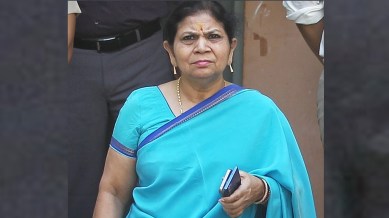Stay updated with the latest - Click here to follow us on Instagram
‘Namaz not the only trigger for violence; foreign students need to be sensitised’: Gujarat University V-C Neerja Gupta
Gujarat University VC Neerja Gupta told the Indian Express that the offering of namaz could not have been the only provocation for violence on Saturday night.

Foreign students at Gujarat University need to be “mentored” and culturally sensitised about food habits and conduct in view of the sentiments of the “vegetarian society” in the state, according to Vice-Chancellor Dr NEERJA GUPTA.
What triggered violence on Saturday night at the varsity?
One particular event (the offering of namaz) cannot be the trigger for such a big incident.
What could have then led to the clash?
It’s not a question of a religious practice… it might be a cultural practice. Foreign students should have been mentored in a better manner in terms of cultural assimilation.
For example, they eat non-vegetarian food. But Gujarat is primarily a vegetarian society. The dumping of leftovers can become an issue. If leftovers are dumped in the open, street dogs can create a menace. The public space is shared by everyone. As these are foreign students, they come to notice quickly. So that is why I said that this cannot be about just one incident. We are not so insensitive or intolerant to someone offering namaz. We have to mentor them (foreign students) in better ways and let them know about the local society, customs, and prevalent emotions… so that they can remain safe.
What could be other triggers, according to you?
The other thing, I feel, is that they need a dialogue. Violence in any society would trigger a larger problem. They should also feel heard. It is also an opportunity for us because they are our ambassadors. They take our culture to the world.
Gujarat is a very safe society. I have handled this (SAP) department for almost two decades – from 2005 to 2021. So I have seen they love our music, our food, and our clothes. The local society nurtures that confidence.
Did you interact with foreign students after the incident?
Addressing trauma is always our priority. There are counsellors and psychologists. Since yesterday, I have met the foreign students thrice. Last night, I was with them for more than an hour. I think they are mature enough. It’s been almost a year since they are here. So they also understand certain things slowly. We need to tell them how the resistance is expected in some manner. As we say – “India mein attack hua, Gujarat me hua…” (There was an attack in India, in Gujarat); similarly for them also, it is about an entire country. So they leave a legacy. It is up to them to decide what legacy they want to leave. I decided to take up this conversation myself. I have handled many conflicts which we resolved in the past.
It has been said that representations were made by local students on issues related to foreign students. Were these representations submitted in written form?
No written representation was submitted. Or the higher authorities were not aware of any such representations. There might be some verbal complaints and that too at a lower level. These lapses have now been flagged.
Did the issues, which had been festering earlier, come to light after Saturday’s incident?
Yes, only when we tried to inquire… and these are some of the issues that led us to (go for) a change of guard. We found that the former in charge of the Study Abroad Programme was overworked and had health issues. And right now, he may not be in a situation to take the pressure. Each staff member is precious to us and at the same time, the administration is very important.
One common concern of foreign students is they do not find anybody to talk to or address their problems.
It has been noted seriously. Two decades back, I started with one (foreign student) and we reached 400. There were several orientation practices that helped us to increase the intake. I think somewhere we need to bring back the practices.
What kind of cultural sensitivity are we referring to and what were the steps taken for it?
Earlier we used to give a handbook to students that would include the do’s and don’ts about the local culture. Besides, there is always a gap between expectations and reality. They might land here with so many expectations. They may find a different environment. They may be in contact with their other counterparts in another city where the atmosphere is different. But I came to know that now there was no practice or handbook, of late. It has been discontinued.
Were there any other measures taken to bridge the gap between foreign and local students?
There were orientation sessions for the first 10 days in the (local) language. Foreign students were given a small Gujarati handbook for interacting with locals or for information about landmarks. We also arranged interactions, and dialogues, community gatherings, and celebrated special days for different nations. They were also told about local cultural festivals such as Holi or Diwali.
We also used to interact with the directors, principals, and heads of departments to tell them what is expected of them. I found this too has been discontinued.